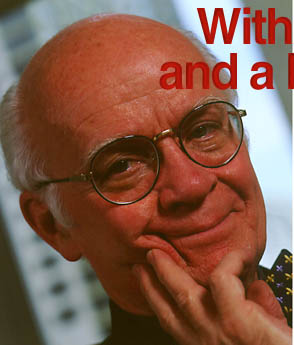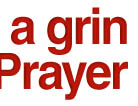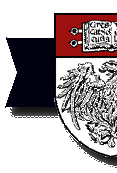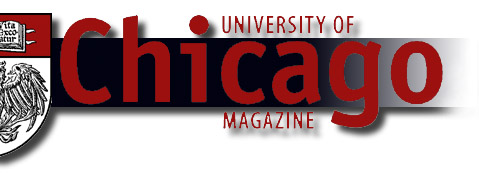 |
 |

| Winner
of the 1998 University of Chicago Alumni Medal, Divinity
School scholar Martin Marty, PhD'56, is...well, he's Martin
Marty. |
|
| By Kerry Temple |
| Photography by Dan Dry |
|
|
Martin Marty.
A name you have heard for 10, 15, maybe 20 years. As in: "Martin
Marty says."
Newsweek, Nightline,
The New York Times. Martin E. Marty. Expert witness, scout, seer,
sentinel. Master surveyor of America's religiocultural landscape.
The "most influential interpreter of religion" in the country today,
according to Time magazine. "The Thomas Jefferson of the world of
theology," says former Senator Paul Simon. "The quintessential public
intellectual and public historian," says Catherine Albanese, professor
of religious studies at the University of California, Santa Barbara.
You try bringing
Marty into focus-bow tie, tweed vest, the mirthful eyes, and impressive
bald dome wreathed thickly in tufted white-and you remember this
too: When a neophyte graduate student came to the University of
Chicago Divinity School back in the late 1970s, he kept hearing
others-in hallways and classrooms-saying "Martin Marty this" and
"Martin Marty that." Sounded, he thought, like a cartoon character.
But even then,
20 years ago, Martin Marty, PhD'56, who joined the Divinity School
faculty in 1963, was the name you heard or read whenever (and pretty
much wherever) theologians, pundits, politicians, and the media
examined the impact of religion-or some aspect of religion-on the
national psyche. In fact, in 1978 the editors of 26 religious magazines
voted Marty and Billy Graham as the two people having the most influence
on religion in the United States.
Today the
man with the name is, quite literally, legendary.
You consider,
for example, the staggering productivity. Marty is the author of
50 books (including a National Book Award winner and five or six
"classics" in American religious history) as well as 4,300 articles,
essays, reviews, papers. He recently retired-at age 70-as senior
editor of the influential weekly The Christian Century, and still
edits the fortnightly newsletter Context, which explores the role
of religion in public life. Add to that, a colleague estimates,
the 100 or so talks/speeches/lectures he gives each year-outside
Chicago-and you have a scribe/writer/ wordsmith of near-mythic profusion.
Maybe 400,000 published words a year.
And this doesn't
include the quotes, statements, and sound bites accorded a national
media eager for expert testimony on topics ranging from medical
ethics to religion's future in the next millennium-those profound,
insightful, yet accessible, opinions regarding the nature of religion,
God's place (and His people's), in a pluralistic, technoscientific,
largely secular world.
Then, too,
there is that legend-maker Bibfeldt business. Franz Bibfeldt, the
celebrated German theologian whose oft-cited doctoral thesis purportedly
set upon an unresolved problem of chronological proportions-the
year zero-which (scholars now must agree) doesn't exist. Yet in
1950 and 1951, at Concordia Seminary in St. Louis, where a young
Lutheran seminarian named Martin Marty ran the campus bookstore
and edited the student theological magazine, Bibfeldt's legacy proliferated-his
ideas cited in discussions, footnoted in term papers; his books
on order at the bookstore, wanted at the library.
Marty himself
signed a review of Bibfeldt's The Relieved Paradox about
the time church officials asked him to consider serving a congregation
in London that Marty happily figured would lead to the life he wanted-parish
ministry. But a telegram called him back from Christmas vacation
a day early. The seminary, it seemed, had caught on to the Bibfeldt
hoax, was not as amused as the students, and saw Marty's contributions
to the scam as a sure sign of immaturity. He'd be kept closer to
home, under watchful eyes. So the scholastic prankster landed at
Grace Lutheran Church in River Forest-and graduate school. Marty
and the University of Chicago would thereafter be joined.
"And that
is why," Marty would later explain, "Bibfeldt, who didn't exist,
has influenced me more than any theologian who did."
Whether divine
intervention or happy accident, Bibfeldt's maneuver keyed an extraordinary
career. Marty not only became one of the Divinity School's shining
lights, but also the nation's foremost scholar on church history.
The native of West Point, Nebraska, marched with Martin Luther King,
Jr., in Selma, Alabama, and was one of the rare Protestants participating
at Vatican II, the Roman Catholic Church's historic summit meeting
in the mid-1960s. And, later in his career, a brief meeting at O'Hare
Airport led to a lasting friendship with television producer Norman
Lear, creator of Archie Bunker, Mary Hartmann, Maude, and George
Jefferson.
|



